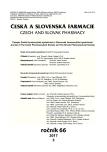-
Medical journals
- Career
The extent of the burnout syndrome among pharmacists: partial study
Authors: Markéta Saligerová; Jozef Kolář
Published in: Čes. slov. Farm., 2017; 66, 107-111
Category: Original Articles
Overview
The paper deals with the possibilities of investigating the susceptibility to burnout syndrome in pharmacists and pharmaceutical assistants working in pharmacies. By using the Maslach Burnout Inventory, between November 2015 and January 2016, 53 healthcare professionals were contacted in 11 pharmacies (Brno, Vyškov). The results of the research show that with an increasing length of practice the average EE factor (emotional exhaustion) increases. The DP (depersonalization) factor does not increase significantly with the increase in the length of practice. Respondents with the longest experience are at high risk of burnout syndrome presented by the factor PA (personal satisfaction from work). It has also been shown that with an increasing age the factor EE slightly increases, the DP factor is in the low range, and the PA factor is significantly reduced in the “oldest” age category, it is high in the band.
Key words:
stress • burnout syndrome • pharmacists • research
Sources
1. Freudenberger H. J. Staff Burn-Out. J. Soc. Issues 1974; 30(1), 159–165.
2. Eckel F. M., Jang R. Communications Sought on Pharmacist Burnout. Am. J. Hosp. Pharm. 1981; 38(5), 628.
3. Jang R., Eckel F. M. Pharmacist Burnout Study. Am. Pharm. 1981; 21(5), 4–5.
4. Pomáhající profese. Slovník sociálního zabezpečení. http://slovnik.mpsv.cz/pomahajici-profese.html [05. 03. 2017]
5. Pelcák S., Tomeček A. Syndrom vyhoření – psychické důsledky výkonu práce expedienta. Prakt. lékáren. 2011; 7(2), 87–90.
6. Kolář J., Fousková J. Psychická zátěž lékárníka. Farm. Obzor 2006; 75(12), 309–318.
7. Kolář J., Poláčková, J. Fyzická zátěž lékárníka I. Farm. Obzor 2007; 76(2-3), 38–45.
8. Kolář J., Poláčková J. Fyzická zátěž lékárníka II. Farm. Obzor 2007; 76(5), 103–109.
9. Baštecká B. Klinická psychologie v praxi. 1. vydání. Praha: Portál 2003.
10. Maslach C., Jackson S. E. Maslach Burnout Inventory – Human Services Survey (MBI-HSS). In: Maslach C., Jackson S. E., Leiter M. P. (eds.) MBI Manual (3rd ed.) Palo Alto, CA: Consulting Psychologists Press 1996. Cit. dle: Micklevitz S. A. Professional Burnout. Illinois Park and Recreation 2001; 32(4), 25–27.
11. Lahoz M. R., Mason H. L.: Maslach burnout inventory – factor structures and norms for USA pharmacists. Psychol. Rep. 1989; 64(3), 1059–1063.
12. Lahoz M. R., Mason H. L. Burnout among pharmacists. Am. Pharm. 1990; 30(8): 28–32.
13. Gupchup G. V., Lively B. T., Holiday-Goodman M., Siganga W. W., Black C. D. Maslach Burnout Inventory – Factor structures for pharmacists in Health Maintenance Organizations and comparison with normative data for USA pharmacists. Psychol. Rep. 1994; 74(3), 891–895.
14. Gupchup G. V., Singhal P. K., Dole E. J., Lively B. T. Burnout in a sample of HMO pharmacists using the Maslach burnout inventory. J. Manag. Care Pharm. 1998; 4(5), 495–503.
15. Zanni G. R. Burnout: When everyday irritations ruin your career. Pharm. Times 2008; 74(3), H2–H5.
16. Rozbowsky P., Cervai S., Gabassi P. G., Gregori D., Semeraro A. Investigation of burnout in a sample of Italian pharmacists. Int. J. Psychol. 2000; 35(3–4), 79.
17. Jocic D. D., Krajnovic D. M. State anxiety, stress and burnout syndrome among community pharmacists: Relation with pharmacists’ attitudes and beliefs. Indian J. Pharm. Educ. Res. 2014; 48(2), 9–15.
18. Calgan Z., Aslan D., Yegenoglu S. Community pharmacists’ burnout levels and related factors: an example from Turkey. Int. J. Clin. Pharm. 2011; 33(1), 92–100.
19. Higuchi Y., Inagaki M., Koyama T., Kitamura Y., Sendo T., Fujimori M., Uchitomi Y., Yamada N. A cross-sectional study of psychological distress, burnout, and the associated risk factors in hospital pharmacists in Japan. BMC Publ. Health 2016; 16(534), 1–8.
20. Basson M., Rothmann S. Sense of coherence, coping and burnout of pharmacists. SAJEMS 2002; 5(1), 35–62.
21. Rothmann S., Malan M. Work-related well-being of South African hospital pharmacists. SAJIP 2011; 37(1), Art. 895, 11.
Labels
Pharmacy Clinical pharmacology
Article was published inCzech and Slovak Pharmacy

2017 Issue 3-
All articles in this issue
- Herpes simplex virus infection: an overview of the problem, pharmacologic therapy and dietary measures
- Drugs and dosage forms as risk factors for dental caries
- The extent of the burnout syndrome among pharmacists: partial study
- The role of a hospital pharmacist in the management of asthma in Great Britain
- Effect of the vaginal pessaries Melanizol® and Klimedeks® on the glycogen level in the vaginal tissue of rats on the background of experimental vaginitis
- Czech and Slovak Pharmacy
- Journal archive
- Current issue
- Online only
- About the journal
Most read in this issue- Herpes simplex virus infection: an overview of the problem, pharmacologic therapy and dietary measures
- Drugs and dosage forms as risk factors for dental caries
- The extent of the burnout syndrome among pharmacists: partial study
- The role of a hospital pharmacist in the management of asthma in Great Britain
Login#ADS_BOTTOM_SCRIPTS#Forgotten passwordEnter the email address that you registered with. We will send you instructions on how to set a new password.
- Career

